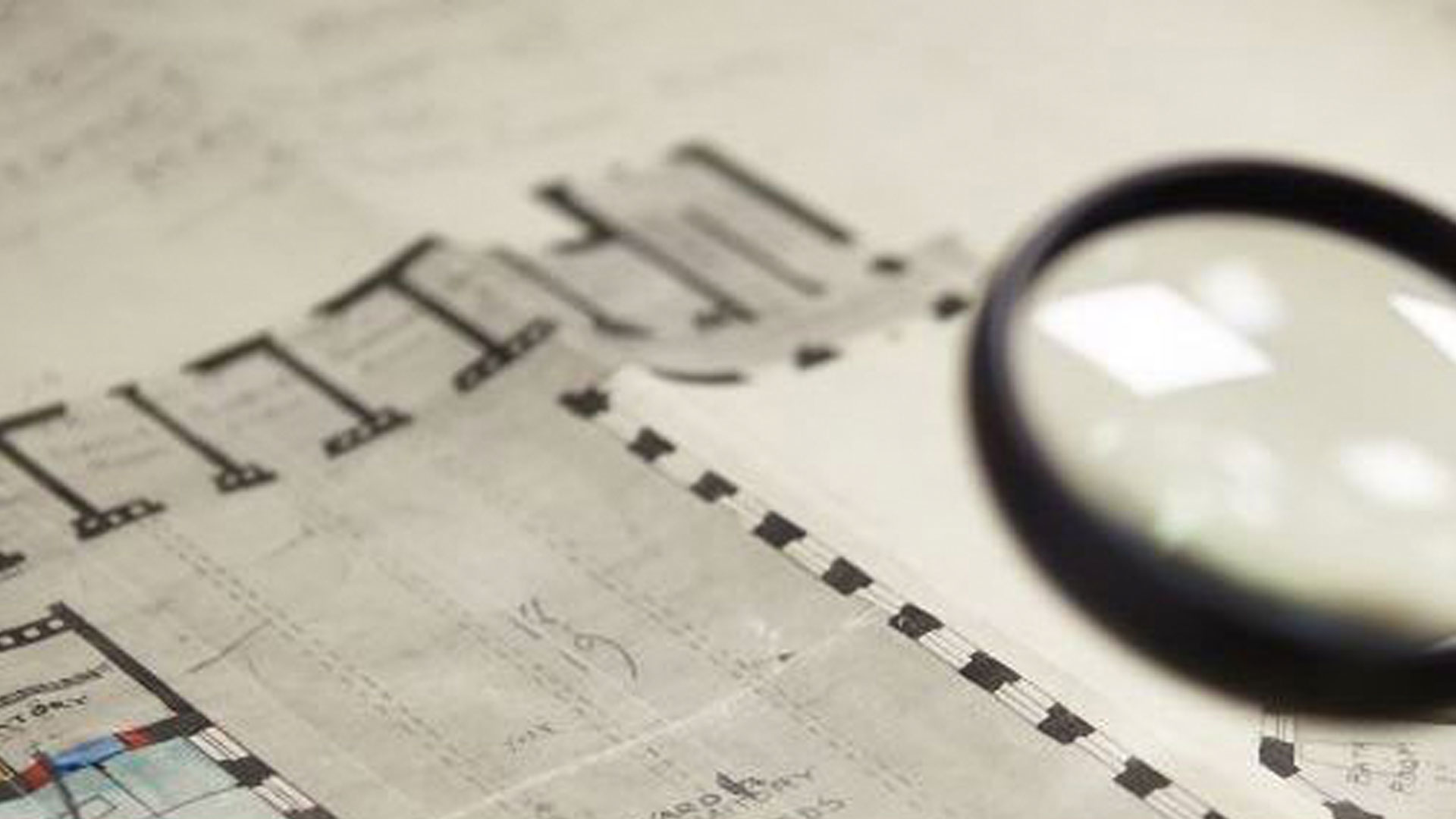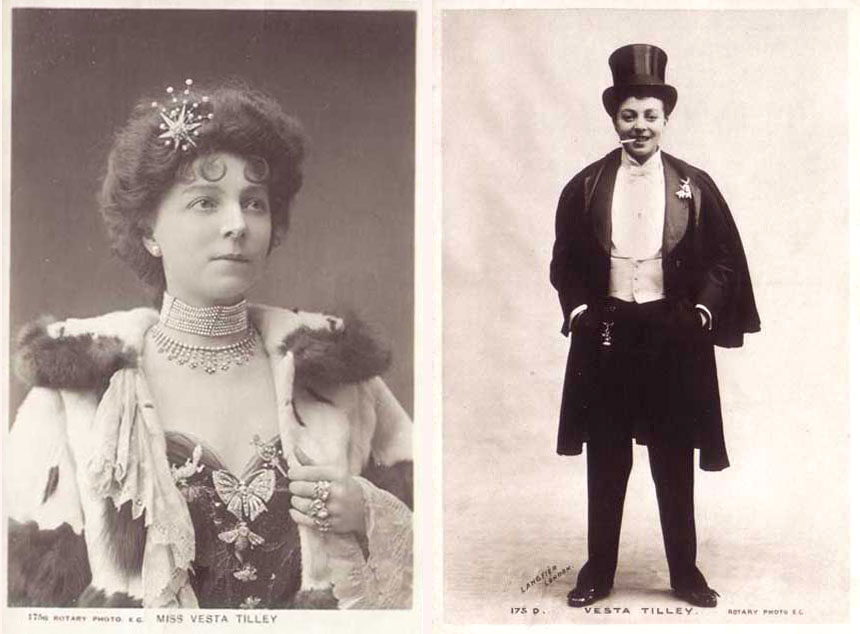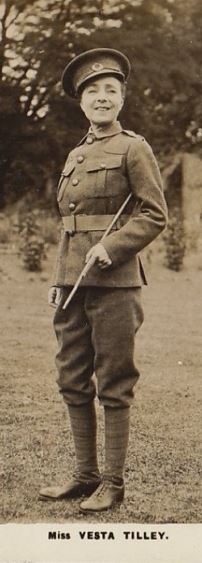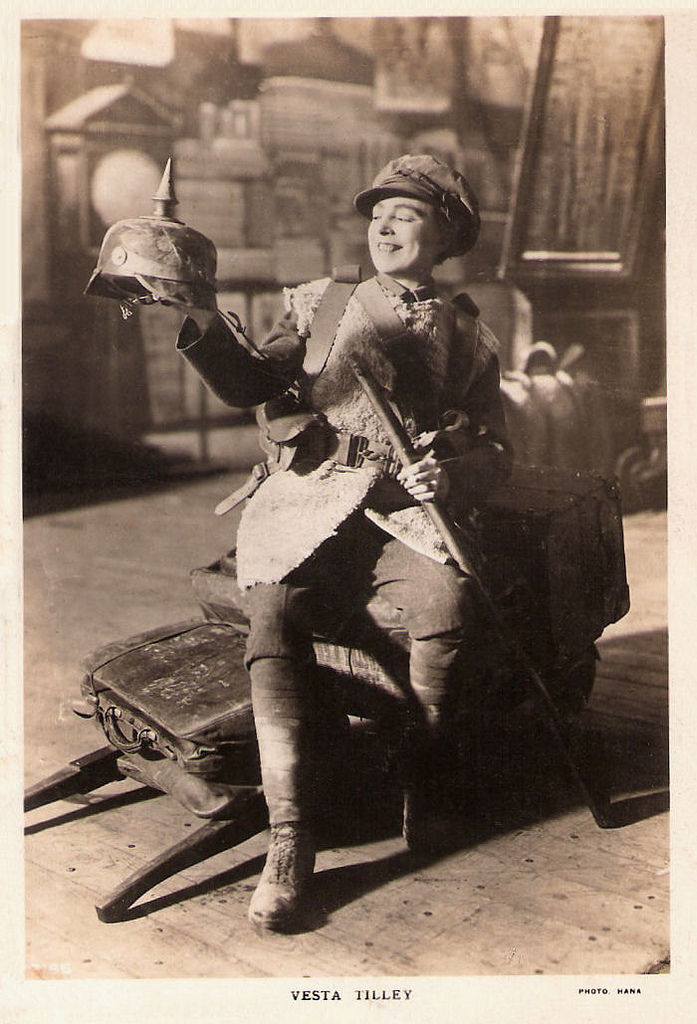
Getting to Know Vesta Tilley by Jo Dyrlaga
Women in disguise have often played a surprising part in military history and there are lots of historical examples of women who dressed up as soldiers to fight for their country. Performers on the music hall stage only did so temporarily for entertainment, yet they still managed to make a significant mark in less direct ways. Male impersonators were hugely popular both at home and overseas and many considered them to be role models. As well as taking part in recruitment drives, male impersonators also performed in front of both British and American forces throughout the First World War.

Many military recruitment campaigns focused on the transformation of ordinary young men into disciplined and smart soldiers. And no soldier in England underwent such regular and public transformation as the music hall star Vesta Tilley.
Vesta was already an extremely popular male impersonator on the music hall stage by the time the war approached. Born in 1864, as Matilda Alice Powles, she was well known for playing boyish young characters. Favourites were ‘Burlington Bertie’ the aristocratic fop, ‘Sidney’ the aspiring masher haberdasher, and ‘Algy’ the foolish young man about town. However her most iconic and enduring characters were young military recruits.
These lyrics from her popular song The Army of Today’s Alright show Vesta as the boisterous and confident young recruit come to save the day:
Everything was wrong till the day I came along
Then the band played, and they all hoorayed
“You’ve saved us” said Kitchener with delight
I joined the army yesterday so the army of today’s all right.
Tilley believed that music hall could play an important role in the war effort and actively encouraged men to sign up during her performances. At the beginning of the war Vesta held recruitment events as well as performing patriotic pro-war material. One such evening in Hackney she even raised sufficient personnel to form the ‘Vesta Tilley Platoon’, with whom she claimed to maintain contact, sending supplies and comforts.
Music hall was traditionally very patriotic, and enlistment drives in theatres were not unusual. However Vesta’s level of success appears to have been unprecedented. She was regularly referred to as ‘Britain’s greatest recruitment sergeant’ in the press.
Despite her considerable popularity, Vesta’s approach was not universally approved of. Some people felt that women should not be permitted to wear the King’s uniform on stage. Vesta took immense pride in the special authorisation she was granted to wear her uniform and curtly dismissed such critics as ‘old clubroom fogies’.

A more weighted criticism is the story of Kate Morter, whose husband Percy was convinced to volunteer on the spot after Vesta singled him out at a music hall enlistment drive in 1915. During an interview recorded in 1964 Ms Morter describes how a friend asked her and Percy to the Palace Theatre but instead of the usual show, they arrived to find Vesta Tilley asking men to sign up to the army right there on stage.
We never knew until we got there… Anyway we got there and she was recruiting… When she got to our stall, where we was, she hesitated a bit, and I don’t know what happened. She put her hand on my husband’s shoulder… and as the men was all following her down, he got up and followed her down too. And they all went on the stage… [the Officers took] their names, and they received the King’s shilling.
One year later, her husband was killed in battle at the Somme. Morter regretted going to the theatre that night and said that she would never have gone if she had known.

After the conflict ended Vesta’s attention turned to the returned troops. She professed that she had great respect for serious theatre, but believed that it was only light entertainment that could provide relief for ‘the boys who have been through the war’. By 1919 Vesta and her husband Walter de Frece had raised a million pounds for the King’s Fund for the Disabled Officers and Men of all branches. Her husband was subsequently knighted for his efforts and Vesta became Lady de Frece.
I am interested in getting to know Vesta Tilley because I am writing a PhD about historical representations of gender by focusing on male impersonators on the music hall stage c.1890-1920. You can find my academia.edu page here or find me on twitter on @dyrlaga_jo